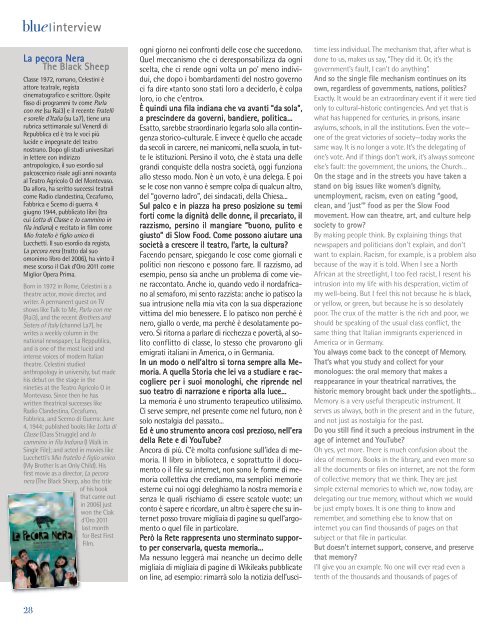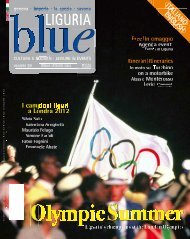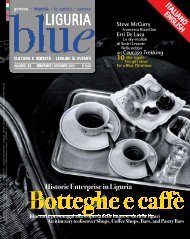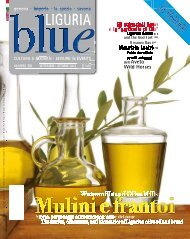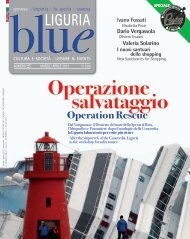Facciamoci sorprendere - Blue Liguria - Sagep
Facciamoci sorprendere - Blue Liguria - Sagep
Facciamoci sorprendere - Blue Liguria - Sagep
You also want an ePaper? Increase the reach of your titles
YUMPU automatically turns print PDFs into web optimized ePapers that Google loves.
lue<br />
28<br />
interview<br />
La pecora Nera<br />
The Black Sheep<br />
Classe 1972, romano, Celestini è<br />
attore teatrale, regista<br />
cinematografico e scrittore. Ospite<br />
fisso di programmi tv come Parla<br />
con me (su Rai3) e il recente Fratelli<br />
e sorelle d'Italia (su La7), tiene una<br />
rubrica settimanale sul Venerdì di<br />
Repubblica ed è tra le voci più<br />
lucide e impegnate del teatro<br />
nostrano. Dopo gli studi universitari<br />
in lettere con indirizzo<br />
antropologico, il suo esordio sul<br />
palcoscenico risale agli anni novanta<br />
al Teatro Agricolo O del Montevaso.<br />
Da allora, ha scritto successi teatrali<br />
come Radio clandestina, Cecafumo,<br />
Fabbrica e Scemo di guerra. 4<br />
giugno 1944, pubblicato libri (tra<br />
cui Lotta di Classe e Io cammino in<br />
fila indiana) e recitato in film come<br />
Mio fratello è figlio unico di<br />
Lucchetti. Il suo esordio da regista,<br />
La pecora nera (tratto dal suo<br />
omonimo libro del 2006), ha vinto il<br />
mese scorso il Ciak d'Oro 2011 come<br />
Miglior Opera Prima.<br />
Born in 1972 in Rome, Celestini is a<br />
theatre actor, movie director, and<br />
writer. A permanent guest on TV<br />
shows like Talk to Me, Parla con me<br />
(Rai3), and the recent Brothers and<br />
Sisters of Italy (channel La7), he<br />
writes a weekly column in the<br />
national newspaper, La Reppublica,<br />
and is one of the most lucid and<br />
intense voices of modern Italian<br />
theatre. Celestini studied<br />
anthropology in university, but made<br />
his debut on the stage in the<br />
nineties at the Teatro Agricolo O in<br />
Montevaso. Since then he has<br />
written theatrical successes like<br />
Radio Clandestina, Cecafumo,<br />
Fabbrica, and Scemo di Guerra: June<br />
4, 1944; published books like Lotta di<br />
Classe (Class Struggle) and Io<br />
cammino in fila Indiana (I Walk in<br />
Single File); and acted in movies like<br />
Lucchetti’s Mio fratello è figlio unico<br />
(My Brother Is an Only Child). His<br />
first movie as a director, La pecora<br />
nera (The Black Sheep, also the title<br />
of his book<br />
that came out<br />
in 2006) just<br />
won the Ciak<br />
d'Oro 2011<br />
last month<br />
for Best First<br />
Film.<br />
ogni giorno nei confronti delle cose che succedono.<br />
Quel meccanismo che ci deresponsabilizza da ogni<br />
scelta, che ci rende ogni volta un po’ meno individui,<br />
che dopo i bombardamenti del nostro governo<br />
ci fa dire «tanto sono stati loro a deciderlo, è colpa<br />
loro, io che c’entro».<br />
È quindi una fila indiana che va avanti “da sola”,<br />
a prescindere da governi, bandiere, politica...<br />
Esatto, sarebbe straordinario legarla solo alla contingenza<br />
storico-culturale. E invece è quello che accade<br />
da secoli in carcere, nei manicomi, nella scuola, in tutte<br />
le istituzioni. Persino il voto, che è stata una delle<br />
grandi conquiste della nostra società, oggi funziona<br />
allo stesso modo. Non è un voto, è una delega. E poi<br />
se le cose non vanno è sempre colpa di qualcun altro,<br />
del “governo ladro”, dei sindacati, della Chiesa...<br />
Sul palco e in piazza ha preso posizione su temi<br />
forti come la dignità delle donne, il precariato, il<br />
razzismo, persino il mangiare “buono, pulito e<br />
giusto” di Slow Food. Come possono aiutare una<br />
società a crescere il teatro, l’arte, la cultura?<br />
Facendo pensare, spiegando le cose come giornali e<br />
politici non riescono e possono fare. Il razzismo, ad<br />
esempio, penso sia anche un problema di come viene<br />
raccontato. Anche io, quando vedo il nordafricano<br />
al semaforo, mi sento razzista: anche io patisco la<br />
sua intrusione nella mia vita con la sua disperazione<br />
vittima del mio benessere. E lo patisco non perché è<br />
nero, giallo o verde, ma perché è desolatamente povero.<br />
Si ritorna a parlare di ricchezza e povertà, al solito<br />
conflitto di classe, lo stesso che provarono gli<br />
emigrati italiani in America, o in Germania.<br />
In un modo o nell’altro si torna sempre alla Memoria.<br />
A quella Storia che lei va a studiare e raccogliere<br />
per i suoi monologhi, che riprende nel<br />
suo teatro di narrazione e riporta alla luce...<br />
La memoria è uno strumento terapeutico utilissimo.<br />
Ci serve sempre, nel presente come nel futuro, non è<br />
solo nostalgia del passato...<br />
Ed è uno strumento ancora così prezioso, nell’era<br />
della Rete e di YouTube?<br />
Ancora di più. C’è molta confusione sull’idea di memoria.<br />
Il libro in biblioteca, e soprattutto il documento<br />
o il file su internet, non sono le forme di memoria<br />
collettiva che crediamo, ma semplici memorie<br />
esterne cui noi oggi deleghiamo la nostra memoria e<br />
senza le quali rischiamo di essere scatole vuote: un<br />
conto è sapere e ricordare, un altro è sapere che su internet<br />
posso trovare migliaia di pagine su quell’argomento<br />
o quel file in particolare.<br />
Però la Rete rappresenta uno sterminato supporto<br />
per conservarla, questa memoria...<br />
Ma nessuno leggerà mai neanche un decimo delle<br />
migliaia di migliaia di pagine di Wikileaks pubblicate<br />
on line, ad esempio: rimarrà solo la notizia dell’usci-<br />
time less individual. The mechanism that, after what is<br />
done to us, makes us say, “They did it. Or, it’s the<br />
government’s fault, I can’t do anything”.<br />
And so the single file mechanism continues on its<br />
own, regardless of governments, nations, politics?<br />
Exactly. It would be an extraordinary event if it were tied<br />
only to cultural-historic contingencies. And yet that is<br />
what has happened for centuries, in prisons, insane<br />
asylums, schools, in all the institutions. Even the vote—<br />
one of the great victories of society—today works the<br />
same way. It is no longer a vote. It’s the delegating of<br />
one’s vote. And if things don’t work, it’s always someone<br />
else’s fault: the government, the unions, the Church…<br />
On the stage and in the streets you have taken a<br />
stand on big issues like women’s dignity,<br />
unemployment, racism, even on eating “good,<br />
clean, and ‘just’” food as per the Slow Food<br />
movement. How can theatre, art, and culture help<br />
society to grow?<br />
By making people think. By explaining things that<br />
newspapers and politicians don’t explain, and don’t<br />
want to explain. Racism, for example, is a problem also<br />
because of the way it is told. When I see a North<br />
African at the streetlight, I too feel racist, I resent his<br />
intrusion into my life with his desperation, victim of<br />
my well-being. But I feel this not because he is black,<br />
or yellow, or green, but because he is so desolately<br />
poor. The crux of the matter is the rich and poor, we<br />
should be speaking of the usual class conflict, the<br />
same thing that Italian immigrants experienced in<br />
America or in Germany.<br />
You always come back to the concept of Memory.<br />
That’s what you study and collect for your<br />
monologues: the oral memory that makes a<br />
reappearance in your theatrical narratives, the<br />
historic memory brought back under the spotlights…<br />
Memory is a very useful therapeutic instrument. It<br />
serves us always, both in the present and in the future,<br />
and not just as nostalgia for the past.<br />
Do you still find it such a precious instrument in the<br />
age of internet and YouTube?<br />
Oh yes, yet more. There is much confusion about the<br />
idea of memory. Books in the library, and even more so<br />
all the documents or files on internet, are not the form<br />
of collective memory that we think. They are just<br />
simple external memories to which we, now today, are<br />
delegating our true memory, without which we would<br />
be just empty boxes. It is one thing to know and<br />
remember, and something else to know that on<br />
internet you can find thousands of pages on that<br />
subject or that file in particular.<br />
But doesn’t internet support, conserve, and preserve<br />
that memory?<br />
I’ll give you an example. No one will ever read even a<br />
tenth of the thousands and thousands of pages of


